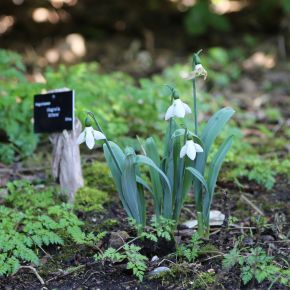Galanthus elwesii
(Greater Snowdrop)
Family - Amaryllidaceae
Category - Bulb
Origin - Bulkans, West Turkey
Discovered By - John Elwes, botanist
Year of Introduction - 1875
Season of Interest - Winter
Hardiness - H5
Height - 20cm or more
Width - 8cm
Location - The Woodland Walk
Description: A low-growing, bulbous Perennial with a clump-forming habit. Fleshy grey-green to dark green Basal Leaves are lanceolate to strap-shaped and upright. Elegant snow-white flowers are nodding or pendent and bell-shaped. The Blooms have three shorter, notched inner petals that usually have separate green marks at the base and the tip, though occasionally these marks merge to form one large band. Three larger outer petals are oval in shape and unmarked. The Blooms are held singly on upright stems and are produced in late winter. The flowers have a sweet fragrance which is best appreciated when brought indoors.
Galanthus elwesii is variable.
Award of Garden Merit (AGM).
Additional common name - Elwes's Snowdrop
Flower:
Fragrant white flowers are nodding to pendent and bell-shaped. The blooms have three shorter, notched inner tepals (petals) that usually have separate green marks at the base and the tip, though occasionally these marks merge to form one large band. Three larger, outer tepals are oval in shape. The blooms are held singly on upright stems and produced in February. This type has green ovaries.
Flower colour: White, green
Flower shape: Bell-shaped flowers held singly
Flowering time: February
Foliage:
Grey-green to dark green leaves are lanceolate to strap-shaped. Each bulb produces two (occasionally three) upright, Basal Leaves.
Foliage Senescence: Deciduous
Foliage Shape: Lanceolate to strap-shaped
Poison Information:
This plant may cause discomfort if ingested
Propagation:
Division, seed.
Cultivation:
Best in full sun to partial shade in fertile, moisture-retentive soil that is well-drained. Protect from drought during the summer months.

